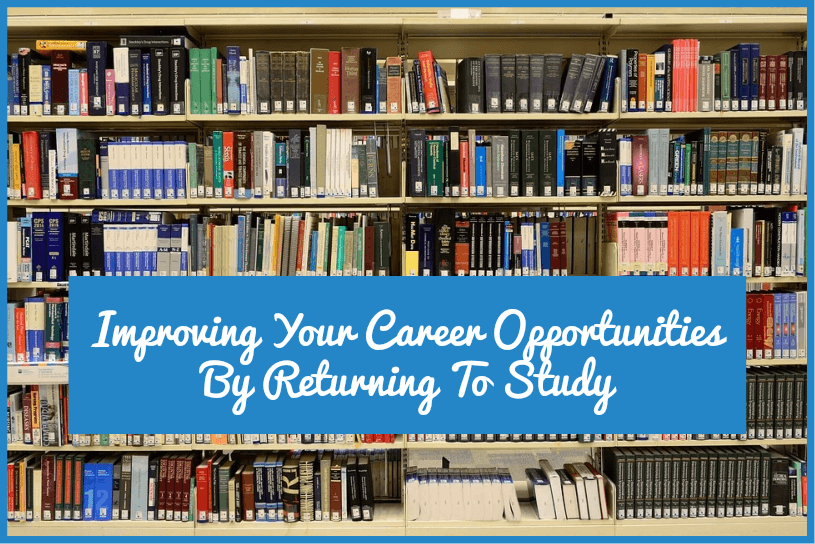
Improving Your Career Opportunities By Returning To Study
If you are looking to improve your career opportunities, then one of the ways that you may wish to achieve this is through a return to study. Every year, more and more people are returning to some form of higher education. It does not matter what age you are, what your career history is, or your background, there are opportunities for you to develop your skills and experiences through academic studies.
You may have previously been to university many years ago. But for whatever reason, you may have decided that it is time for you to return to education. This may be to undertake a different undergraduate degree and follow a new career path, or it could be to further your existing degree with a postgraduate qualification such as a master’s degree, or a doctorate. With the right flexible opportunity, you may be able to fit this course of study around your current career. Alternatively, you may be planning on taking a career break so that you can return to education full time to achieve this goal.
If you have never been to university, then it is never too late.
You may have left high school and gone straight into the job market, or your focus may have been on starting a family. Not knowing what you want to do when you are young can also lead to many people choosing not to go to university straight out of high school.
The simple fact is that when you are faced with a decision that is not only costly, but will financially impact you for the rest of your life, making the wrong decision should be avoided by deferring until you feel better equipped to decide.
But, if you have decided to go back to an academic environment, you may not know where to start, or what to expect. Here are some tips to help you understand how you can develop your career prospects through a return to education.
What, Where, And How?
There will be lots of questions that you will need to answer when you are deciding on which university, course, and method of study you will go for. Work backward. What do you hope to achieve at the end of the course? Is there a very specific job that you want to get out of it? That will give you an indication of the course. Then there is the choice of how you will go about studying it. You could choose to actually enroll in the university and attend classes, or you could opt for an online course such as this master of music education course at Kent State.
Online courses have come a long way in the last few years. With faster broadband speeds and better technology, the ability to interact with students and provide a better range of course materials and support services mean that you can study remotely much easier. That means that if you want to get a degree awarded by a particular university, you won’t have to move closer to it.
Online degrees are valid qualifications too. Your work will be assessed by an accredited institution, and the tutor or mentor support that you will receive will be from people with the same level of academic excellence that you would get from a taught course.
On the other hand, though, there are many arguments in favor of taking part in a fully taught course. The interactions that you make in the classroom and the relationships you may build up with your fellow students may be far stronger and could be beneficial to your studies.
Adjusting To The Workload
Getting used to the level of work involved in your workload is important. There will be a lot of work, and it is essential that you understand that you need to be proactive and set your own goals.
University study differs from that of high schools in that it is largely self-directed. You may need to go to lectures and seminars, but the work that you submit will often be that which has been derived by you. You may have been given a short brief, but you will need to find an area to research and develop an angle for your work. Nobody else will do this for you.
You only have to submit a few pieces of work throughout your entire study. But you may need to spend several hundred hours at least researching your work before you even begin writing it up. Allow plenty of time for this, and schedule it into your routine early on.
Managing The Stress Of Study And Balancing Your Life
University studies can be very stressful, even more so if you are combining this with a career too. Getting the balance right is essential, as a failure to do so may cause you to become stressed and very run down.
When you are stressed, you won’t be able to think properly. You may end up getting exhaustion and this will affect your ability to carry out the work. For that reason, it is important that you really do look after yourself.
Looking out for the signs of stress and taking measures to manage these feelings is crucial. Take plenty of breaks. Work out a clear schedule that allows time for you to work, study, relax, as well as exercising and sleeping.
Sleep is very important as, without it, you will not be able to concentrate. It can really cause problems with your physical health too. Try and get a full eight hours of sleep each night
Spend time with family and loved ones as much as possible. When you have a lot on your plate, relationships may come under pressure. Try and set out a day each week when you will keep your work and study schedule completely free. Make this a day that is entirely about your family, and also use it as a chance to take your mind off the stresses and strains of the rest of your life.
© New To HR


